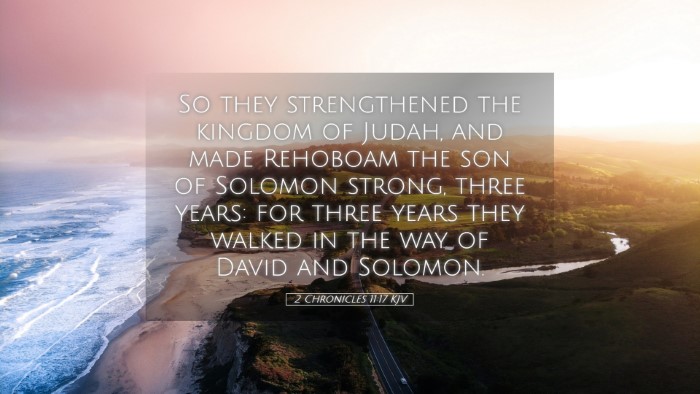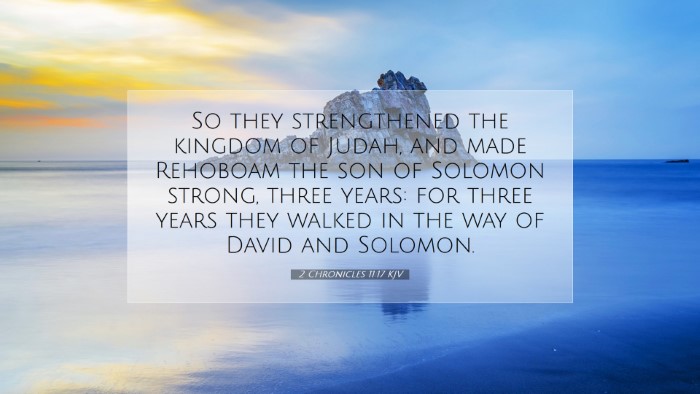Commentary on 2 Chronicles 11:17
2 Chronicles 11:17 states:
"So they strengthened the kingdom of Judah, and made Rehoboam the son of Solomon king, and they strengthened him three years: for three years they walked in the way of David and Solomon."
This verse encapsulates a significant period in the history of Judah, marking the time when Rehoboam, son of Solomon, ascended to the throne after the division of the kingdom. Below is a compiled commentary reflecting insights from esteemed public domain commentaries.
Strengthening the Kingdom of Judah
The phrase "So they strengthened the kingdom of Judah" indicates a deliberate effort by the people of Judah to unify and establish stability under Rehoboam's leadership. Matthew Henry notes that this strengthening was both political and spiritual, suggesting that the people recognized the necessity of aligning themselves under a godly king who could lead them according to the traditions established by their forefathers.
Actions Post Rehoboam's Ascendancy
In this context, the people made a concerted effort to solidify Rehoboam's rule. Albert Barnes elaborates on how the decisions during this time were crucial. The alliances and strategic geographic placements of fortified cities were primary factors in ensuring the security of the kingdom. This rebuilding was essential to regain the lost territories and influence after Solomon's reign.
The Significance of Rehoboam's Kingship
Rehoboam's rule is marked by an interesting paradox: although he was the son of Solomon, who was known for his wisdom, Rehoboam's early choices did not reflect the same prudence. Adam Clarke emphasizes that for the initial three years, Rehoboam had a loyal following, indicating that there was a season of adherence to the teaching and governance of David and Solomon.
Walking in the Ways of David and Solomon
The verse mentions, "for three years they walked in the way of David and Solomon." This phrase is critical for understanding the relationship between a king and his subjects. It raises questions about the nature of leadership and the communities’ adherence to divine principles. Henry reflects on how this period of obedience provided a foundation for Rehoboam's future reign, enabling him to garner support and build a governance model that drew from Davidic traditions.
Theological Reflections
There are various theological implications drawn from this verse that pastors, students, and theologians should consider:
- The Role of Leadership: The support given to Rehoboam illustrates the significance of strong, godly leadership in promoting a collective moral and spiritual direction.
- The Importance of Historical Legacy: The adherence to the paths of David and Solomon highlights the necessity of learning from past leaders who walked in covenant with God, providing a template for contemporary issues faced by leaders today.
- Temporal Stability vs. Spiritual Integrity: The initial strengthening of the kingdom serves as a reminder of the transient nature of political power, demonstrating that true strength lies in persistent reliance on God.
Contextual Considerations
The historical context surrounding Rehoboam’s reign is crucial for interpreting this verse. Following Solomon's rule, tensions rose that ultimately led to the division of Israel. The loyalty of the tribe of Judah and parts of Benjamin to Rehoboam, as outlined in previous verses, indicates a complex socio-political landscape influenced by tribal loyalties and past leadership styles.
Lessons for Modern Application
For contemporary readers, 2 Chronicles 11:17 serves as a profound lesson on the necessity of unity and proper leadership. The initial years of Rehoboam's reign illustrate that even in the face of adversity, the principal focus should be on aligning with divine wisdom and the teachings of Scripture. As these insights unfold, they invite deeper reflection on the leadership styles prevalent today, challenging pastors and theologians to examine their calls within the congregational and societal frameworks.
Conclusion
In summary, 2 Chronicles 11:17 provides rich insights into the dynamics of leadership and faithfulness in the context of Jewish history. With references to the ways of David and Solomon, we are reminded of the vital impact that righteous leadership has on shaping communal identity and purpose. The commentary from these respected theologians reveals that the understanding of this verse is crucial to fostering a deeper connection with biblical history and its implications for modern faith practices.
As we meditate on this scripture, let it inspire leaders to engage in practices that strengthen not just their positions, but also the spiritual and moral fabric of their communities.


